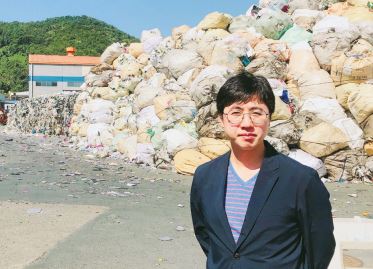Lee Dong-hak / the president of ‘Trash Center’ at Center for Civic Awareness and Policy Making

To learn more about the dark truth behind recycling and disposing of plastic bottles, JBNU Globe Reporters interviewed Lee Dong-hak, the president of ‘Trash Center’ at Center for Civic Awareness and Policy Making.
What is the current state of recycling and waste sorting in Korea?
Korea produces one hundred sixty million tons of trash annually, equivalent to fi lling one thousand fi ve hundred ‘63 building’s each year. Since this seems to increase every year, it is essential to dispose of them properly.
However, recycling in our country is still insuffi cient. This is because, during waste sorting, improperly disposed of waste is often eliminated from the RTS (Recycling Track System). Only twenty to thirty percent of the trash is recycled as materials such as bags and clothes. The trash problem will continue unless this fi gure is dramatically raised.
What is the future for the policies of waste sorting in the post-COVID-19 era?
The use of disposable has significantly increased. In the past, when we order jajangmyeon, it used to come in a washable bowl, and was reused by simply washing it. However, in the disposable age we no longer wash dishes. Disposables might be cheap and convenient for individuals to use, but the aftermath comes back to us as trash chaos.
The policies should be changed to encourage the use of more of a multi-use items rather than disposable products. If disposables are inevitably used, more detailed standards and education about sorting should be settled.
Where does the trash go after the dump?
If we dump the trashed in street bins or bags at home, the separately discarded recyclables are moved to a screening area located around the city. Reclaimable materials are then shredded and shipped to a factory.
Meanwhile, other plastics are moved to incinerators or landfills. The waste in a standard plastic bag is shipped directly to a landfill or incinerator.
Removing the lids and the labels of plastic bottles before throwing them away does not sound like a big deal. What difference does this make?
PETs can be more valuable resources if we separately dispose of them. Until last year, Korea imported about twenty-two thousand tons of discarded plastic bottles, which means its sorting system was failing.
The proper way to dispose of the PET bottles is to empty, wash, and remove all the labels. The reason for doing so is that the body of the PET bottles and the labels are made of different materials. There are many types of plastics, such as PP, PS, PE, and more, so when they get mixed, they cannot be made into a single material. Do not forget that waste sorting is collected and recycled based on their source materials.
Are there any tips and methods for separating one’s trash?
Please do not throw away the dirty trash. Make a habit of throwing PET bottles away after washing them. The recycling waste that eventually goes to the screening area is once again filtered by the workers there by hand. It is a kind of courtesy to fellow citizens. Dirty plastics cannot be recycled anyway. The moment you make trash clean, it turns into resources, not trash.
Please tell us more plastic-related trivia you know or information about the organization you run.
The amount of plastic produced around the world is about three hundred sixty million tons a year. Every country tries to reduce waste, but production has been increasing every year.
At the same time, the amount of trash that was produced has continued to grow, too. There are instances of advanced countries, including Korea, that cannot dispose of waste on their own, so they secretly throw it away in developing countries. Developing countries also do not have the means to dispose of trash. As a result, they eventually dump it into the sea. This kind of pollution kills sea creatures.
Unfortunately, it is estimated that the amount of plastic waste that goes into the sea every year is more than thirteen million tons. There is a grim prediction that there will be more trash in the sea than sea creatures by 2050.
We, the young generation, should pump the brakes on this brutal trend. We can work together to try to use fewer disposables in our daily lives. I hope we talk more about these kinds of environmental issues with our neighbors and friends. Changing public opinion can change the world.
By Ku Halin, So Woobin, Shin Soul Reporters

